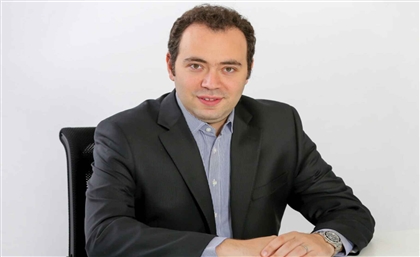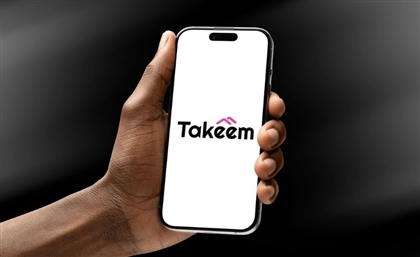25 Under 25: The Entrepreneurs Reshaping Egypt's Startup Landscape for the New Decade
They're changing mindsets, challenging the status quo, fusing high-tech to the traditional, freshening up stale sectors and hustling their way into the new decade. This is our 2020 rundown of some of the brightest and boldest young entrepreneurs in Egypt...
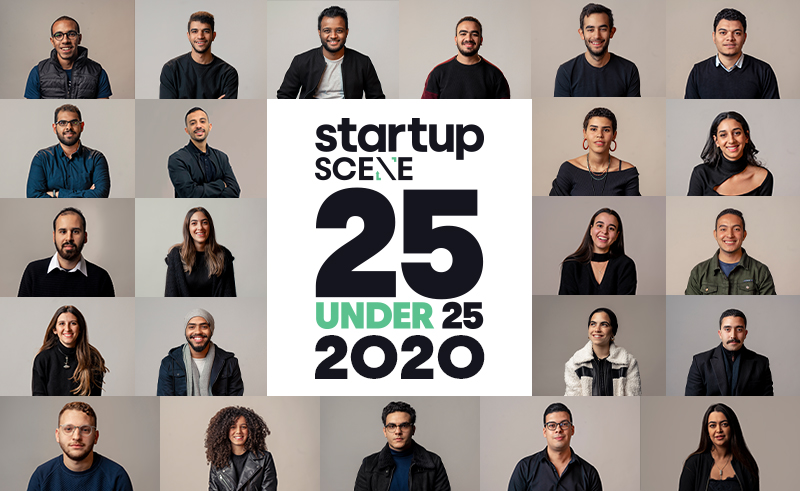
As per annual StartUpScene tradition we spent the last few months scouring the length and breadth of the country to put together a list of some of the most promising Egyptian entrepreneurs under the age of 25. We were looking for those who are making a difference in their industries or communities, trying to set new standards in their sectors and refuse to be shackled by how 'things are done' but dream of how they could be done better. We invited these young upstarts into our studios to tell us their stories and share their irresistible vision. The result is a dazzling display of optimism, ambition, energy, and the limitless power of youth. These are StartUpScene's 25 under 25 for 2020...
TOURISM: Ahmed Raafat, 23, Mohamed Ahmed, 24 // VisGo
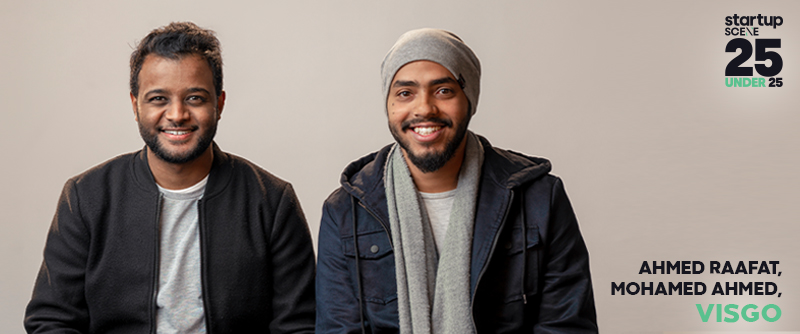
Born of a 16-year friendship that started on the streets of Aswan, the VisGo app - created by Ahmed Raafat and Mohamed Ahmed - is an audio-visual storytelling portal designed to guide you through Egypt's greatest monuments, from the Great Pyramids of Giza to the Karnak Temple, from The Valley of the Kings to the Temple of Abu Simbel and beyond. Growing up in one of the world's most spectacular living heritage sites no doubt sparked their imaginations, but it was Raafat's engineering degree (Ain Shams, Cairo) and Ahmed's summer stint studying Heritage Management and Storytelling at Universität zu Köln in Germany that would equip them with the tools to take on tech and tourism. "I gained a newfound appreciation for these buildings," says Ahmed. "The stories behind them... So many stories!"
Raafat and Ahmed found their way to Falak Startups - the Cairo-based accelerator designed to support and empower the next generation of Egyptian entrepreneurs - which is currently incubating them, and the rest is, well, ancient history. Their pay-per-visit mobile app is now used by an army of professionals and veterans in the tourism industry. The mobile app however is just the first phase of VisGo’s roll out. “The next phase will give birth to the VisGo platform," reveals Raafat. "It will enable all kinds of content creators, food bloggers, travel bloggers, or historians to create their own audio guides, similar to the ones we curate, so they can publish it on the mobile app.”
FASHION: Anne-Marrie Kirollos, 24 // Tiyi
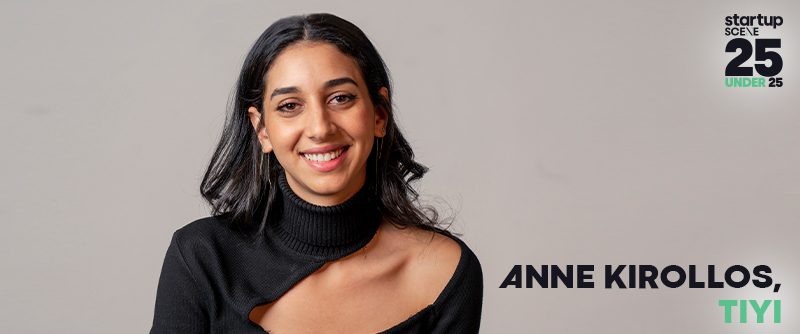
With sprawling stores in Egypt's biggest shopping complexes (such as Mall of Egypt and CityStars), appearances in some of the world's most prestigious publications (including fashion bibles Vogue and Harper's Bazaar) and appearances in the wardrobes some of the region's hottest celebrities (including Mona Zaki and Hend Sabry), 24-year-old Anne-Marrie Kirollos's fashion line Tiyi is making quite the sartorial statement. Independent Arab fashion designers are experiencing a real moment right now and the proudly-Egyptian Tiyi is one of the achingly cool brands at the centre of the stylish action.
Before launching her own fashion enterprise and spending long days and even longer nights alongside factory workers twice her age, Kirollos found her footing at the 'Harvard of Fashion,' London’s Central Saint Martins, where she met an investor who encouraged her to take her ambitions to the next level. At only 22, she was able to launch a fashion brand that found its inspiration – and name - in Tutankhamun’s grandmother, Tiyi, the first Egyptian queen to have statues built at the same height as her husband as recognition of her influence and power.
Beyond the promise of runway shows and red carpet glamour, Kirollos seeks to build her brand on the foundations of sustainability, which is reflected in the brand’s day-to-day operations – from weaving their own fabrics and to having her own water recycling system at her factory. While this all amounts to a remarkable stack of achievements in her very young career, there are still mountains to conquer for Kirollos and her team, benchmarks and challenges that she has set for herself; “Our mission is to keep on making clothes until we stop importing from abroad and be capable of catering for the entire Egyptian population.”
FIN-TECH: Ibrahim Eid, 24 // Valify
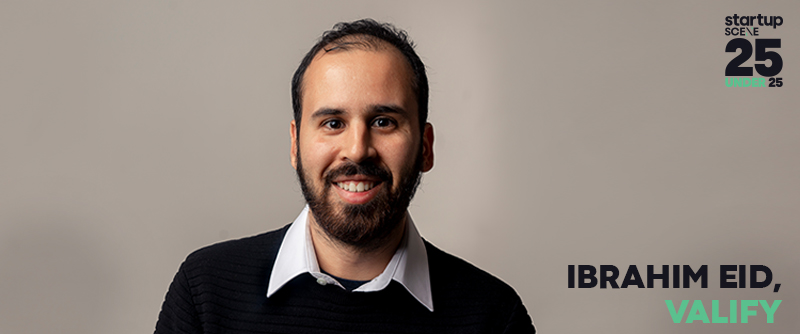
While powerful tech leaders the world over continue to discuss solutions for banking the unbanked, seemingly in vain, 24-year-old Ibrahim Eid has quietly gone about creating Valify, and in doing so enabled the Central Bank of Egypt to start tackling the issues that stem from 84% of Egypt's population being unbanked.
Founded alongside partner-in-crime, Omar Abdel-Wahed, the fin-tech startup offers digital identity solutions to telecom and financial institutions. In layman’s terms, it offers digital banking services that do away with the interactions and communications that have traditionally only been able to happen at a bank. With Eid boasting a background working at several fin-tech startups and Abdel-Wahed’s previously having worked at PayMob, it only made sense for the duo to launch their own fin-tech company and a seemingly unlikely shot-in-the-dark approach to the Central Bank has set them on their way.
“People who can’t be physically queued up at a bank or a telecom counter, don’t have access to any financial services,” says Eid. “We were able to introduce the Central Bank to the concept of electronic KYC (Know Your Customer) that replaces the requirement of having to go in person to a bank or telecom branch and stand in line for your turn.”
The app – the crux, of you will, of the whole startup – offers state-of-the-art features, including ID and document verification, biometric facial recognition and even Arabic-English transliteration at the base of its operation. Moving forward, however, Eid is under no allusions in regards to the baggage that comes with breaking down the walls of financial inclusion. “The product changes laws and regulations,” he explains of the daunting task still ahead. “It‘s going to take a lot of work to make this happen.”
REAL ESTATE: Farah Selim, 24 // CO-55
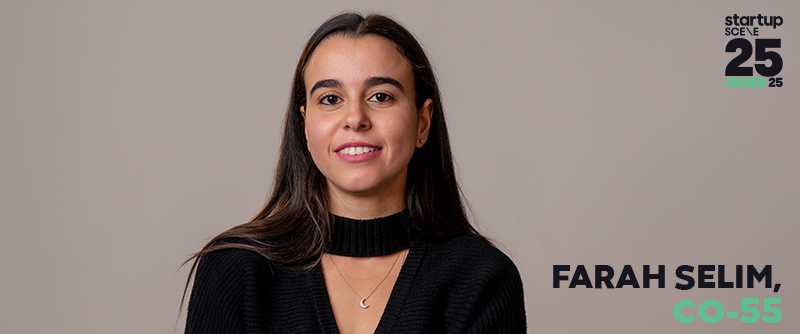
Farah Selim and her two siblings, Ahmed and Norhan, have always had their lives planned out for them - study hard, graduate from a good university, and start working in one of the generations-old family businesses, City Center Mall and Il Mercato, which has been trading in real estate and tourism since 1995.
As the youngest of the family and something of a rebel, Selim wanted more. “I wanted something bigger, something I could call my own,” she tells Startup Scene. Her brother, himself a relative youngster at the age of 26, was also harbouring similar strike-out-on-your-own fantasies and together they decided on leverage empty and unused spaces in the family-owned City Center Mall in Nasr City to create a state-of-the-art co-working space, stepping into a sector that is still wide-open in Egypt despite the WeWork-fueled controversy surrounding the industry in other parts of the world.
The 1200-square-metre CO-55 offers 20 private offices, ranging from 10sqm to 30sqm in size, with each room equipped with chairs, tables, a storage cabinet, an independent landline and a corresponding Wi-Fi router. In the first six months, 12 emerging startups signed private office leases – a remarkable return, but one that can’t simply be credited to good luck. You see, beyond offering physical space and utilities, the Selims have very consciously evolved CO-55 as a community, to the extent that they deliberately diversify the types of startups that they accept, informally capping the number of tenants from any given sector, while conceiving the space with communal spaces, where tenants can – and do – mix. In fact, many of the tenants have gone on to collaborate. One of the tenants, RACK Advertising, has signed several deals with other occupants, for example.
CO-55's client roster includes the likes of P&G and Johnson and Johnson, and they've been able to rapidly reach and maintain a consistent 75% occupancy rate. Despite this, Selim still faces one particular obstacle. "[When] entering a meeting," she says as she rolls her eyes, "they see three young people doing something big and on a large scale and I notice the way they look at us. 'Look at her, she’s a child.'” But with grand expansion plans afoot for the coming year, she’s not letting the doubters and naysayers shake her confidence. "We’re here to work, we're not kids,” she says defiantly. “I prove to the person in front of me that we're not here to play.”
FASHION: Farah Emara, 24 // Wa7ekaya and Nesaaonline
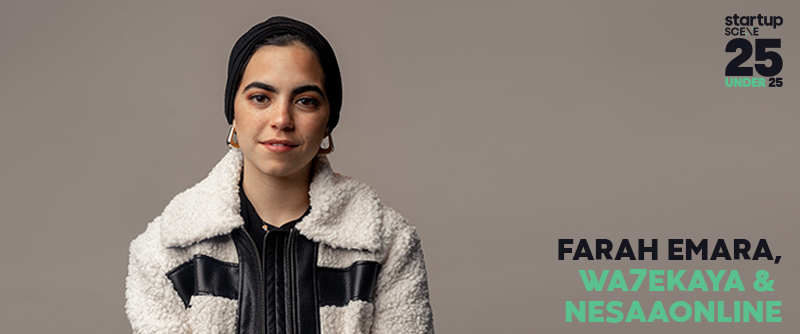
Once upon an impromptu semester off, Farah Emara was on the lookout for a good way to spend that time doing something productive. Deciding to explore her passion for creating with her own hands, she began experimenting with jewellery. “Because I’m a fashion blogger on the side, I wondered why not make headpieces and stuff like that,” she tells Startup Scene of how hair accessory brand Wa7ekaya came to life and began making everything from turbans to bridal tiaras, introducing a specialisation that the market lacked.
One year after Wa7ekaya, Emara co-founded another brand called Nesaa for casual women’s wear, making her a serial entrepreneur with two startups under her belt at just 23. “It’s funny because I actually don’t face any challenges because of my age,” she admits. “It’s actually an advantage, because it’s easier when you tell someone you’re twenty-something and need help, because people will help you.”
Finding yet more inspiration in her 18-year-old sister who also has a brand, and using her background in graphic design to help her 27-year-old husband with the branding of his startup, Emara is fortified by entrepreneurs in her life. With her brands enjoying a following of over 20,000 each, the now 24-year-old entrepreneur is already laying the foundations for her third startup.
“My third brand is essentially going to be two brands cut into two so I can grow them at their own pace,” she says. “And I think I wouldn’t have been able to do that if I hadn’t already founded a brand earlier on.”
DATA: Aly Fakharany, 25 // Arqam FC
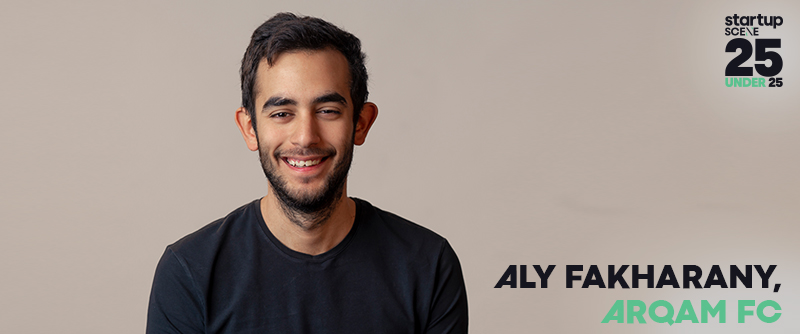
Football – a sport of passion, rivalry and pride. The ‘beautiful game’, however, has come to rely just as much on stats and data analysis as talent, in everything from forming tactics and training regiments, to scouting the next big thing. It’s in reaction to this growing need that 25-year-old Aly Fakharany conceived Arqam, a data analytics startup specialising in providing data analysis to football teams, in May 2016.
This unlikely intersection of data, tech and sports produces all matter of information – how many kilometres did this player run during the match? What’s his shot-conversion rate? How many forward passes did he make? What Arqam does is collect data and give it to the analysis team who turn it into football-specific lingo and metrics that are predictive and stable. Later, Arqam packages all of that into a Software-as-a-Service (SaaS) platform that they sell to coaches and teams all over the world.
“Initially, the concept was to target teams in the region and collect data ourselves,” Fakharany explains of his seemingly unexpected success beyond Egypt and the Middle East. “We’re around 180 people right now; 150 in Cairo and 30 in Bath, UK,” says Fakharany. “We’ve been around for two years and so far, we have 30 clubs on board, most of which are from Europe or the Americas.”
AGRI-TECH: Zeina Shalash, 24 // The Classy Blooms
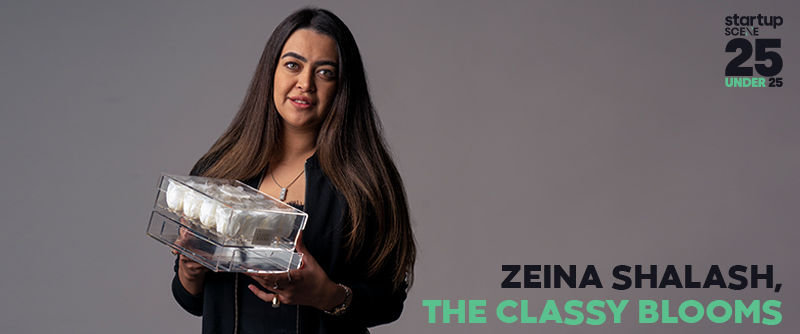
After finishing her last final exam in college, 24-year-old Zeina Shalash rushed to the Startup Scene studio clutching a pack of white roses. “They’re eternal,” she said with a sense of grandeur as she explains the success behind her startup, The Classy Blooms, which sells high quality roses online that are intricately treated with specialist oils to extend their lives for up to two years.
“I wanted to open something that has to do with flowers and I started researching a lot about roses specifically,” she explained, adding that she conducted said research in a greenhouse that she built in her garden. Among her findings, Shalash came to one important realisation: that, in Egypt, roses are weak. During her self-study, she came across the brand Eternal Roses, which acted as the trigger to launch her startup as a one-woman show from her home in February 2018, sourcing the flowers from a factory in Ecuador.
“Overseeing orders and logistics, all while studying for finals is definitely difficult, but it’s also fun and satisfying,” Shalash says, and the proof is in the pudding. In her first week of operations, she had 25 orders and within six months, she had already expanded beyond selling bouquets and undertook floral arrangements for one wedding and two engagement parties.
Two years and hundreds of happy customers later, Classy Blooms now has a standalone office space, separate packaging and delivery teams, as well as dedicated social media team that continues to grow the brand’s 30,000-plus following, with more expansions plans in the work.
“We’re planning to have it all be a Classy Blooms-production. From growing the roses, to the packaging, to the delivery – all of it. For us, by us.”
MEDIA: Abdallah Ghanem, 24, Hazem Mohamed, 21, Ahmed ElSaady, 22 // Arcast
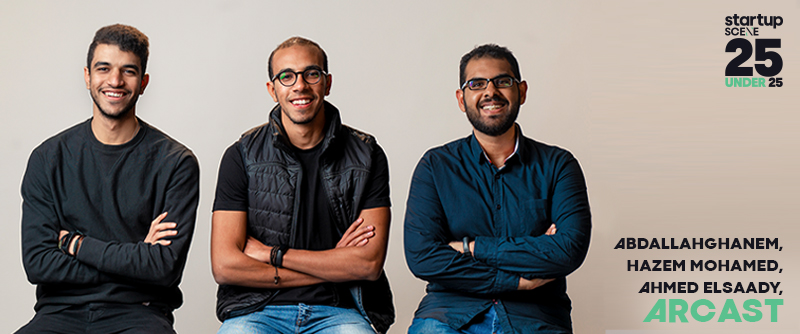
In an era of on-demand, phone-app-based everything, one globally-booming industry and medium still remains lost in the thorny Middle East market: podcasts. Despite giants like Apple still unable to crack the conundrum of how to spread the culture of podcasts in the Arab region, 24-year-old Abdallah Ghanem dropped out of his software engineering degree at Helwan University to take on the challenge by co-founding, Arcast, which was initially conceived as an Arabic-language, Middle Eastern podcast-streaming service, alongside 21-year-old Hazem Mohamed and 22-year-old Ahmed El Saady in July 2018.
Leaning on lessons learned at various bootcamps at the likes of The Greek Campus and an internship at Cairo’s Technology Innovation and Entrepreneurship Center (TIEC), Ghanem’s growing understanding of the entrepreneurial ecosystem pushed him and his cohorts to bravely ditch their initial plans.
“As we went on our journey, we found that it’s a big hassle to make a mobile application for podcasting due to its discovery and Arabic-language adaptability for searching algorithm,” Ghanem explains. Six months later, in January 2019, Arcast took a bold turn and became Egypt’s first ever dedicated podcast production house, eventually going on to establish eight different audio series.
“We have been able to make podcasts on topics ranging from fender bendersin Egypt, to entrepreneurship and startups, to interviews with creatives,” Ghanem says with a sense of pride.
ENTERTAINMENT: Sherif Ashraf, 24 // Ol3oban
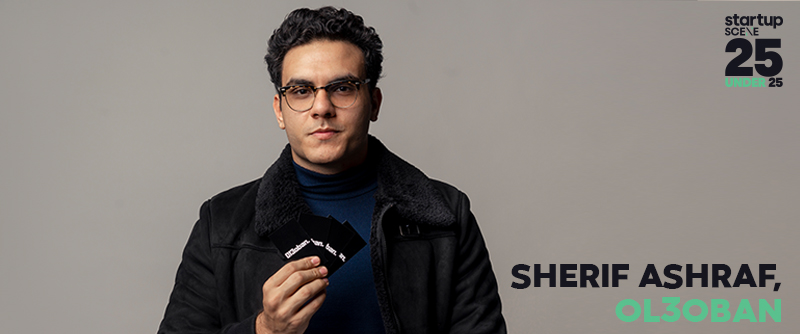
“The black screen of the computer, black coffee, we even sat in a dark room...” 24-year-old Sherif Ashraf recounts of his almost-career as a computer programmer. “It was a miserable life!” When he graduated from Alexandria University, Ashraf thought that compu-communication was his calling. But in a move that would shake every Egyptian parent to their core, he turned his back on a guaranteed career and a forever in-demand skillset in search for “something that can allow me to let go, laugh, and have fun.”
Enter the ludicrously entertaining card game, Ol3oban, which was inspired by the global hit that is US card game, Cards Against Humanity. “It’s not copied or translated,” Ashraf is quick to point out, though. “It’s the same idea, but completely Egyptianised and Arabised. I wanted it to be an Arab game, and to have our expressions, our idioms, our references and our lingo as a generation.”
After several months spent looking for the right print house and dealing with the raised eyebrows of a long line of doubters, November 2019 saw Ol3oban officially unveiled to the world and, within two months, Ashraf had sold a remarkable 500 copies of the 770-card game set – and there’s still more in the pipeline.
“The best thing about Ol3oban is that it’s a game that can be integrated and updated,” Ashraf reveals coyly. “We can add more cards, or a themed set of cards,” he adds. “I want Ol3oban to become a brand that can have a store or a booth anywhere, so basically, an Egyptian, Arabic game brand.”
FIN-TECH: Omar Khalil, 22 // EddyPay
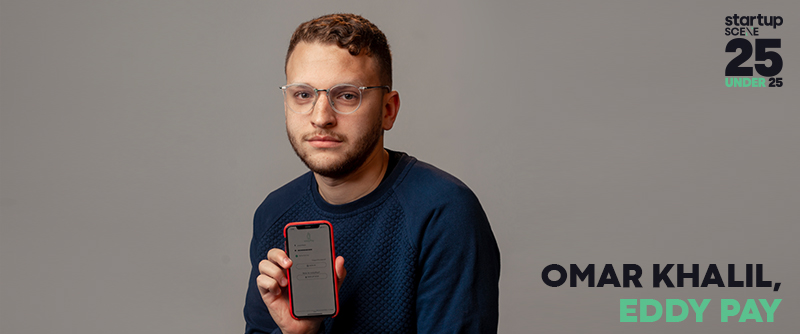
When 22-year-old Omar Khalil started approaching merchants in 2019 to sell them on the idea of his cashless, cardless pay system, EddyPay, he almost always faced the same questions – how old are you, what’s your education and who’s the actual owner of this company?
“The give me funny looks and ask me where I graduated from,” Khalil tells Startup Scene. “I tell them I’m still in university and I haven’t finished yet. Then we go into a weird conversation that leaves them confused.” Ageism aside, the concept of the mobile app, which aims to help the country move towards financial inclusion by introducing QR code and mobile payments to the Egyptian market, has in itself proved to be a hard sell, especially when it comes to convincing traditionalist merchants to trust someone that young with their money. “That was our biggest challenge; taking on the cash culture, a common challenge in the fin-tech space here in Egypt,” Khalil explains.
It was in the fall of 2017 that Khalil began building the groundwork for the app and two years later, in Setember 2019, following its first successful transaction, EddyPay officially hit the market. As of now, EddyPay has six small businesses on the books, but still very much at the beginning of his entrepreneurial journey, Khalil has big ambitions to expand rapidly – ambitions that have been fueled by his own growing reputation. “Actually a lot of people are impressed that there are young people that are trying to do something.”
FASHION: Habiba Abed, 21 // The Chameleon Experience
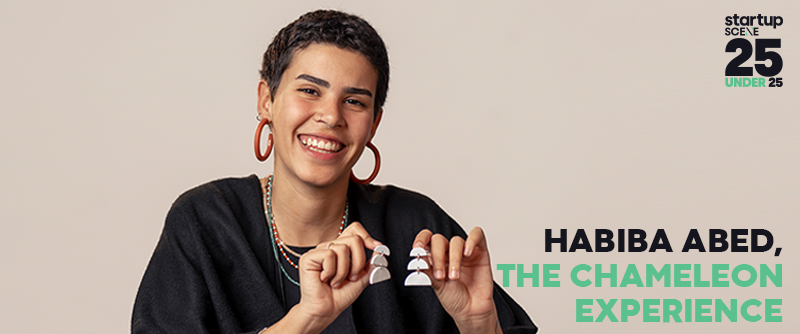
The cross-section where art meets business is a thorny area to navigate, especially for confused artists like 21-year-old Habiba Abed. “I was struggling to find myself as an artist for a very long time,” she tells Startup Scene. “I would keep rebooting my Instagram account and start a new one because I’m distracted by so many different fields.”
To put both her confusion and distraction to sleep, Abed launched The Chameleon Experience as an outlet to engage her artistic senses and help her explore her potential. “I started taking clay lessons and then I found out that you can make earrings out of this thing called polymer clay,” she says. “I went out and searched for it, and I started making earrings, simply because it’s the easiest jewellery [to create], but I hope to expand onto making other things like bracelets and pendants.”
A week after launching her first collection, it completely sold out. However, it’s not all sunshine and rainbows, considering that Abed is just 21 and a graphic design student.
“Graphic design is already very, very demanding,” she says. “I’m doing The Chameleon Experience on the side and it’s not easy juggling both. I’ve been on a break for three weeks because I had exams, so I haven’t even come near my Instagram page.”
The Chameleon Experience is more than just an eccentric accessory brand: it’s a space where she can practice whatever art crosses her mind. “In the future, I dream of having a space with studios that cater to different forms of art, where people can come and work, and maybe host lessons.”
E-COMMERCE: Waleed Hatim, 25 // Ship N’bag
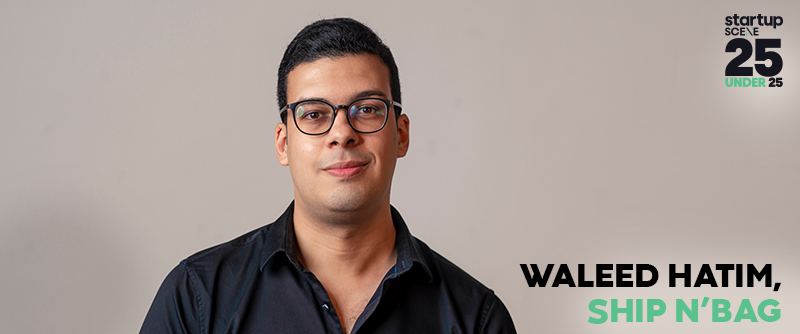
Putting an end to those pesky “Do I know anyone travelling from the US to Egypt this week?” statuses that pop-up on our Facebook feeds so often, 25-year-old Waleed Hatim’s Ship N’bag is a platform and marketplace that customers can use to ship products from the US and UAE with travellers.
“I’ve been an online shopper my whole life,” Hatim tells Startup Scene, revealing that it was only two years ago that he started spotting cracks in a system that he had relied on for so long. Hatim came to realise that the pricing of shipping exceeded logic, common sense, and many people’s budgets.
What the startup does is offer a web and mobile-based platform that provides buyers with a low-cost, secured avenue for shipping, via travellers who earn a commission on the goods that they are asked to purchase and pack with them.
While it certainly provides a solution to a problem, Hatim has faced challenges in his startup’s growth, with Egypt’s rigorous customs regulations standing as one of the toughest. Subsequently, Ship N’bag is making the bold move of rebranding to a new name and is migrating from the shipping business model to the gifting one, to circumnavigate said customs issues, while also opening the door to expansion outside of Egypt, specifically to Morocco and South Africa.
The brilliantly simple idea has caught the imagination of the ecosystem, with a 2017 incubation with INJAZ Egypt seeing them go up against 50 other startups, but ending with a EGP 150,000 prize and an all-expenses-paid trip to Silicon Valley, where they were mentored by tech giants such as Google, Facebook and Uber.
DATA: Omar Ebeid, 25 // Zeal
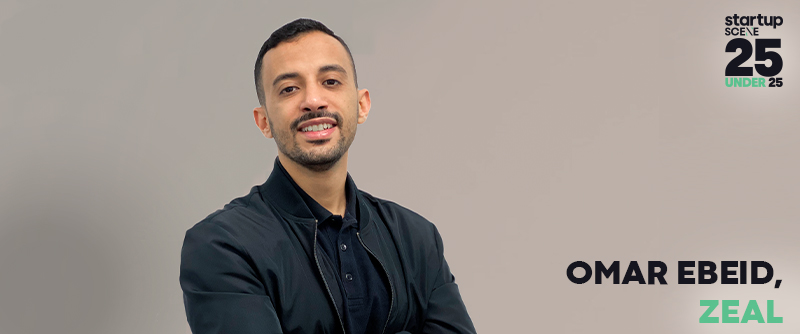
On one sunny afternoon in the British county of Surrey, Omar Ebeid was buying juice from a shop, when the cashier asked him if he had a loyalty card. “I instantly told the cashier that I hate carrying them, because I always forget or lose them,” he tells Startup Scene as he recalls the light-bulb moment that would eventually lead to the founding of Zeal. “It was then that I came up with the idea - why don’t I gather all loyalty cards onto one app?”
The mobile app does away with the old school loyalty-card-and-stamp systems, while generating revenue through data analytics for clients who are have the option to pay a premium fee to access their analytics dashboard. “Our algorithms are able to forecast consumer behaviour based on previous habits and offer personalised rewards, while collecting customer feedback,” says Ebeid. “The user generates a QR code at each transaction to collect digital loyalty stamps on their digital loyalty card. Retailers receive a Zeal scanner app to scan the user’s QR code, meaning they don’t invest in hardware.”
Since launching in September 2018, Zeal has grown to 10,000 users with 25% month-over-month growth, processing over $500,000 from around 25,000 transactions. Operating at around 150 stores across Egypt, the startup was also recently accepted into the world's top university-based accelerator, Set Squared Surrey, which has allowed Zeal to register and launch their product in five stores in Guildford – where Ebeid won the Shooting Star Entrepreneur Award by the Guildford Borough Council in 2019.
Ebeid turned 26 several weeks after our interview.
COSMETICS: Shahenda Shawki, 25 // Smack That Scrub
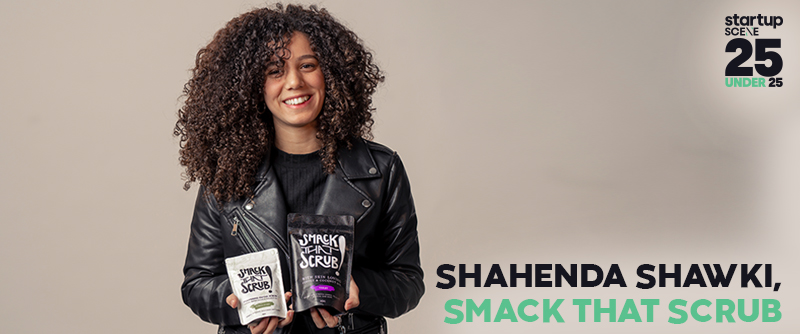
"Smack That Scrub was my bachelor's project at university," 25-year-old Shahenda Shawki told Startup Scene of the beginnings of her medically-informed, all-natural line of skincare scrubs, which has sold over 6,000 units since officially launching in February 2018.
The brand might well have stayed a fleeting, temporary university project, had it not been for a sudden and inexplicable epiphany that inspired Shawki to revisit what was originally just a branding exercise. Two years on from the decision to follow her passion and instincts, Shawki still retains her day-job as a graphic designer, despite carrying the weight of a launching and operating a startup by herself.
“It was really hard for me at first," she says of her unenviable balancing act. "I would finish work at 6 or 7pm, then go home and work on Smack That Scrub," she continued, adding that work on her passion project would spill over into her weekends, too.
Available for purchase online, Shawki’s projects have been flying off the proverbial shelf, as more and more Egyptians come to be aware of the potential dangers found in your everyday drug-store products.
“I love everything organic,” she explains of going all-natural in her own skincare routine for the last six years. “I don’t use anything that has chemicals. So I started making my own lotions and scrubs, when I was in college.” Central to her products is that the scrubs are very deliberately conceived with particular ailments and conditions in mind – such as eczema, stretch marks, cellulite and acne – for which she seeks direction from doctors and medical professional, something that has immediately set her apart in what is becoming a crowded market.
While she admittedly doesn’t see herself leaving her graphic design job anytime soon, that hasn’t held her business back in any way. “I have big aspirations in my head right now, and a lot of things I want to do,” she says confidently. “I want to expand the lines, I want a lot of products and I’m hoping Smack That Scrub will be an international name.”
MARKETING: Ezz El-Damak, 24 // Flat42 Global
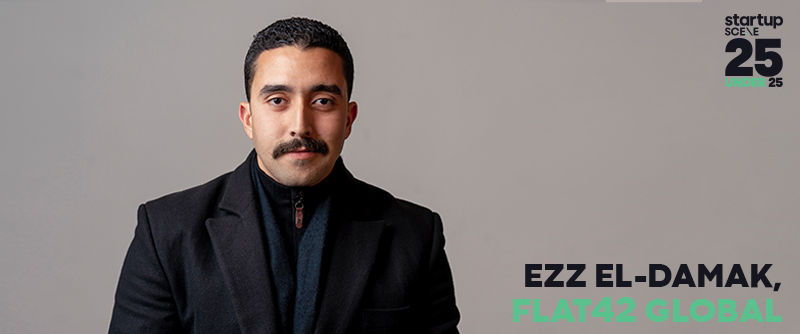
“I lost my entire life savings," 24-year-old Ezz El-Damak tells Startup Scene of his first, unsuccessful foray into the entrepreneurial ecosystem with Lorenzo Borghese, a British-Egyptian fashion-tech startup that aimed to utilise his homeland's rich history in craftsmanship to produce classic menswear. “I gave up one year of my life and I didn’t graduate with my class and all my friends.”
Now, there’s no shortage of inspiring stories in the Egyptian ecosystem that tell of a feisty entrepreneur’s rise from the ashes of a previous failure, but El-Damak’s story has an extra layer, and his second startup, Flat42 Global, aims to protect emerging startups from falling into the same failings as he did.
Leaning on his background as a marketer and business marketing graduate, together with his co-founder Hussein Houta, El-Damak launched his strategic consultancy and marketing agency in London, two years ago, at the age of 22, and started operating in Cairo six months ago. The rationale is simple: while SMEs in Europe – and increasingly in the MENA region – have massive potential, they’re not necessarily able to afford agency fees - and that’s where Flat42 Global comes in.
“I always got frustrated by marketers, as they take budgets and spend them without necessarily helping the business reach where they want to go, numbers wise.”
Now with a team of eight, three of whom are based in London, El-Damak has developed something of an obsession about disproving the often-spoken about statistic that says that 95% of startups fail. “I suffered from a strategic failure,” he recalls of his first startup. “At that point, I discovered that it’s not about what you study in the books. It’s about you getting deep in the mud and understanding the overall business dynamics of your industry.”
DÉCOR: Nour Hussein, Laila Azmi // NL Art
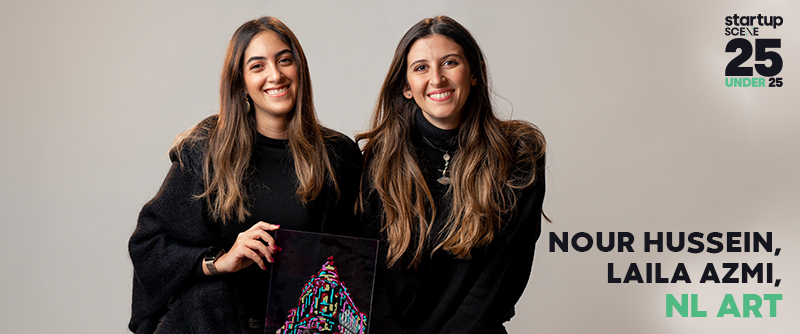
As architects, the celebration, exploration and preservation of Egypt’s architectural heritage matter more to Nour Hussein and Laila Azmi than most 25-year-olds. Through their startup, NL Art, the lifelong friends produce and sell intricate hand-painted artwork on printed translucent photographs that do indeed celebrate, explore and preserve, but in a unique way that has already seen them land on the radars of a range of influential platforms, including the region’s largest retail art fair, World Art Dubai, and the World Youth Forum, which gave the duo their first local exhibition.
“The pieces are layered, in the sense of giving off a 3D view, as we place them with a bit of a distance from a display wall that gives off that effect,” Azmi explains of the startup, which officially launched in January 2019. “We love architecture, so we thought of blending the buildings, the city and the scenes with art; a new form of art that blends photography, paintings and architectural conceptualisation.”
With 50 individual, handmade, extensively-researched pieces sold, the duo are the first ones to admit their surprise at the relative success NL Art has found, and the extent to which the market has understood the potential applications that their ultimately quite niche product has.
“Laila and I treated this as an experimentation project, we didn’t know it would grow this much,” adds Hussein. “We realised later how large the potential of all this is, and we’d fail and then experiment some more. We kept an open mind, with no expectations and just let our art flow.”
REAL ESTATE: Andrew Nady, 22, Ehab Abdellah 23 // SKN
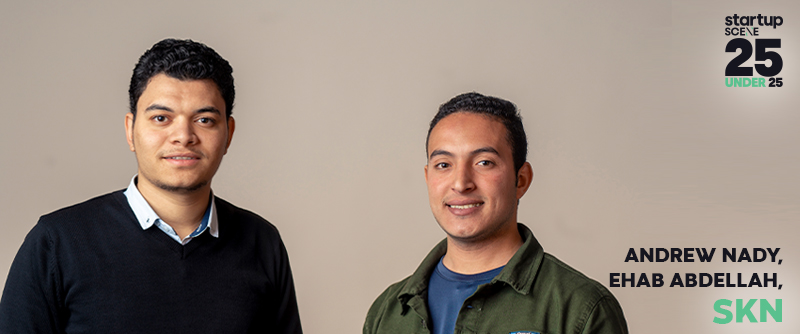
Aiming to serve students and workers who migrate from Egypt’s small towns to its big cities, 22-year-old Andrew Nady and and 23-year-old Ehab Abdellah founded real estate marketplace, SKN ('shelter' in Arabic), from their hometown of Sohag, Upper Egypt in early 2017 to aid the unaided in the often tricky process of relocating.
“The culture in Upper Egypt and state of tech awareness unveiled some issues,” says Abdellah. “We tried to solve that through good UI/UX on our website, for example, and also through diverse payment methods; not all people have credit cards and those who do are reluctant to use them due to privacy concerns.”
Serving the under-served is an M.O. that is often belittled in its complexity, many believing that you’re simply connecting a product or service with a target segment. The founders quickly found out, however, that real estate is a sector full of issues.
“In other industries, your target segment is known,” Abdellah explains, recalling the initial 35 transactions they achieved. “However, we had to hit the streets ourselves, ask around for landlords or vacant residential units, introduce ourselves and try to convince landlords about the value we can offer them. So, that was a challenge.”
With over 300 units listed, 200 bookings reached and stints in TIEC's incubator program and Falak Startup's acceleration program, the SKN team’s ambitions have outgrown their native Upper Egypt, and they’re setting their sights on expanding beyond serving this very specific market in aiming to become the first choice real estate market place for those moving from place to place in Egypt, and even across the MENA region.
“We want to cover as many governorates in Egypt as possible and scale abroad,” Abdellah answers to a question about future plans. “I want to be a second Bill Gates,” Nady says to the same question, with his tongue only very slightly in his cheek.
REAL ESTATE: Ali Ahmed 24, Ahmed Gamal 23, Ahmed Mohamed, 21 // Easy Booking
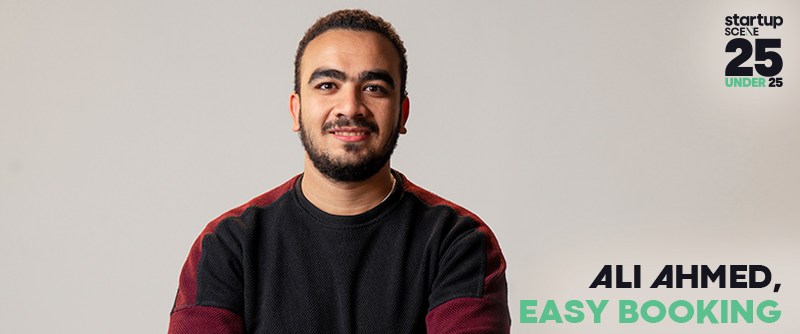
“Someone once kicked us out and asked us to come back with a grown-up,” 24-year-old Ali Ahmed tells Startup Scene of the challenges he continues to face while growing EasyBooking; a platform that acts as a booking middle-man for co-working spaces and offices.
After launching in the fall of 2019, with 23-year-old Ahmed Gamal and 21-year-old Ahmed Mohamed, however, things are looking bright for the Minya native; incubation through the Technology Innovation and Entrepreneurship Centre and achieving a seed round of EGP 180,000 has set EasyBooking on the fast track to success. Providing easy access to spaces is only the first phase of what Ahmed and his co-founders are trying to achieve, however.
Balancing a coveted business development job at Wuzzuf and unfazed by the failure of an agri-tech startup that he launched in 2017 while still at university, Ahmed got back on the proverbial horse to also help evolve and elevate Egypt’s local economies and ecosystems in the long run. So far, they have covered Assiut, Minya, and Sohag, and are set to expand nationwide, with Cairo and Alexandria in the crosshairs, as well as other services.
“We named it EasyBooking because our goal isn’t just workspaces” Ahmed explains. "We want to be a super-app for booking - rooms, houses, even mentors."
Photography by @MO4Network's #MO4Productions




